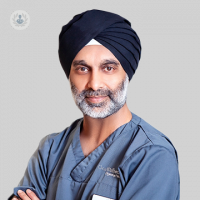How serious is abdominal pain?
Escrito por:A stomach ache usually describes a dull ache in the tummy and is normally short-lived. Abdominal pain is a cause for concern if it occurs suddenly and unexpectedly and should be regarded as a medical emergency. However, some people may have long-term or recurring stomach pain. Expert gastroenterologist Dr Devinder Bansi explains more…

What has abdominal pain been described as feeling like?
Abdominal pain can be described by patients as being sharp, dull, aching, burning, stabbing, colicky and knawing amongst others.
What are the commonest causes of abdominal pain?
The most common causes of abdominal pain include:
- Irritable bowel syndrome (IBS), which may affect the upper or lower part of the abdomen or both
- Non-ulcer dyspepsia
- Peptic ulcer disease (or acid-related pain)
- Gallstones
- Pancreatic pain
Which foods should I avoid if I have stomach pain?
It is best to avoid spicy, rich or fatty and greasy foods when experiencing abdominal pain and limit intake to little-and-often if you regularly suffer from pain. In cases of IBS, trigger foods may include dairy products such as cow’s milk, caffeine, yeast, certain carbohydrates and citrus fruits.
When should I see a gastroenterologist?
If pain persists for more than 48 hours or is very severe, or accompanied by vomiting and diarrhoea, blood loss (coffee ground vomiting or black stool) and fever, it is recommended to see a specialist.
How does the doctor diagnose the cause of my abdominal pain?
A diagnosis is made when a specialist takes a history (asks a variety of questions) and performs a physical examination of the patient. However, they will also have to undertake blood, urine and stool tests as well as consider ultrasound, endoscopy (gastroscopy/colonoscopy) or a CT/MRI scan. It depends on the individual case.
How is abdominal pain treated?
The diagnosis of the cause of abdominal pain will determine the correct treatment or choice of medications for the patient. For example, medications are not necessarily needed for the treatment of stomach flu, whilst tablets are used to treat ulcers and surgery will be necessary to treat gallstones or may be the best way to treat certain cancers in the abdomen. Lifestyle changes, such as a change in diet, exercising more and limiting alcohol consumption is crucial for some individuals


